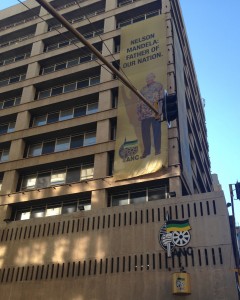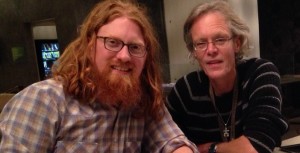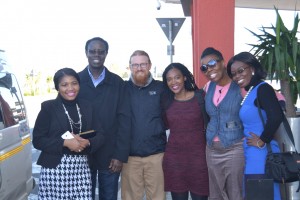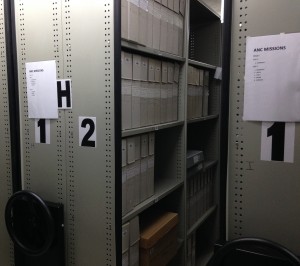My visit to South Africa on assignment for Global Affairs/UNESCO and Archives & Special Collections began in the first week of June in Johannesburg during an unusually cold winter (for South Africa). The purpose of the trip was to explore and convene on the archival landscape which had been mapped in 2000 through a partnership between the African National Congress (ANC) and the University of Connecticut. The initial archives project was funded by the Mellon Foundation to organize, describe and make accessible the ANC archives documenting its activities while in exile under Apartheid. These archives, located at the National Heritage and Cultural Studies Center (NAHECS) University of Fort Hare (UFH) in Alice, Eastern Cape, have been available in their reading room for public research since 2005. Between 2000 and 2005, UConn sent faculty, archivists, librarians and oral historians to UFH to hold training sessions and benefit from this skill sharing partnership. In conjunction, UFH sent archivists and librarians to receive training within the UConn libraries.
A significant documentation project was organized by Bruce Stave of UConn’s Center for Oral History, which led to training a group of South Africans to record oral histories of ANC members about their experiences under Apartheid. As part of the post-custodial model of archival collecting, a facsimile collection (ANC Oral History Transcript Collection) was housed at the Thomas J. Dodd Research Center at UConn’s Archives & Special Collections, making our institution the official repository of the ANC outside of South Africa. The focus of my mission, fifteen years from the inception of the project, was to identify the viability of reengaging the partnership with the ANC and UFH. I visited Luthuli House in Johannesburg where the headquarters of the ANC are located to discuss the future of the digital archives project. In addition, I met with leading South African archivist Verne Harris of the Nelson Mandela Foundation who was involved in training during the initial phase of the project. The Apartheid Museum was also a very immersive experience into the representation of the nation’s history and transition toward democracy which is still ongoing.
From Johannesburg, I traveled to East London in the Eastern Cape to meet my gracious hosts at the University of Fort Hare. Over a course of two days, my visits to the satellite campus to meet with the Vice Chancellor and Deans of various faculties before heading to Alice where the main campus is located, were important context building meetings for understanding the capacities and role the University plays in the community there. An historically black college which has produced many famous voices of liberation such as Nelson Mandela and Robert Mugabe, the University houses the major faculty components, archives and research of the region. Seeing the archives, art gallery, library and research facilities broadened my perspective on how two academic environments could build and support each other through student exchange and faculty and staff training. Our schedule also included a visit to the Steve Biko Centre in King William’s Town which was a fantastic display of community engagement within the walls of a museum and archives space.
Concluding the trip was a visit to Cape Town where I was immediately struck by the contrasts between Capes and Cities within South Africa. The regionalism seemed as starkly contrasted as the elevation change from East to West. Hearing the personal histories of struggle and identity of individuals throughout the journey was as rewarding as the completion of the trip. I made many new friends and colleagues as well as broadened my understanding of the necessary solidarity between information workers from the Global North to South. A personal thank you is extended to all of the individuals who made time for me and answered what were most likely simplistic or culturally unaware questions. The door is open to you all at the Archives & Special Collections.





